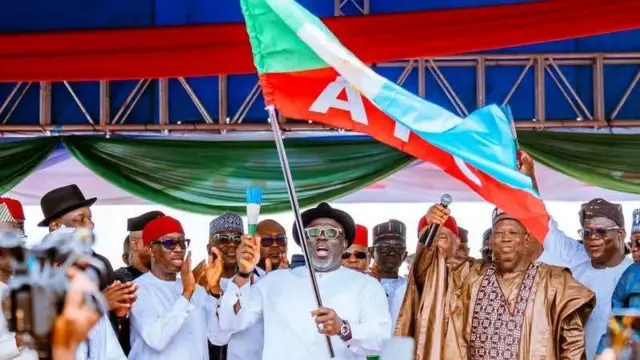Two years ahead of the 2027 general elections, President Bola Ahmed Tinubu appears favoured to clinch the presidential ticket of his party, the ruling All Progressives Congress (APC ) and may eventually be re-elected. That is going by the gale of defections of politicians from the opposition camp to the APC and the array of endorsements he has so far received from politicians across party lines.
In the last couple of weeks, Nigerians have witnessed politicians, particularly members of the National Assembly elected on the platforms of the Peoples Democratic Party (PDP), Labour Party (LP) and New Nigeria Peoples Party (NNPP) leaving their respective parties and joining the APC.
In what appears like passengers on board a sinking ship, jumping into a life boat to escape a looming disaster, these politicians have written letters to the presiding officers in both Chambers of the National Assembly, declaring their loss of confidence in the leadership of their former parties and declaring support for the ruling party at the centre.
In the Senate for instance, with the recent defections, the membership configuration of the political parties is as follows: APC – 68 seats, PDP– 30 seats, Labour Party– 5 seats, SDP– 2, seats, NNPP– 1 seat, and APGA– 1 seat.
In the House of Representatives, the configuration currently is APC- 176, PDP- 118, Labour Party- 35, NNPP- 19, APGA- 5, ADC- 2, SDP- 2 and YPP- 1
A similar scenario has also played out in some State Houses of Assembly, where the opposition political parties were in the majority but now occupy the minority position due to the defection of opposition lawmakers to the APC.
Beyond the defection of individual politicians, the APC made its greatest catch when Governor Sheriff Oborevwori of Delta State and his predecessor in office, Dr Ifeanyi Okowa, triggered an unprecedented political Tsunami that saw the entire political structure of the PDP in the state, collapsing into the APC.
Sunday Telegraph can authoritatively report that what played out in Delta State shook the opposition bloc to its foundation as Delta State had been the home of the PDP for over a quarter of a century.
It was therefore shocking to witness the collapse of a political structure and machinery that had withstood many political battles and won all since 1999.
As if these were not enough, the political leadership in other opposition strongholds have equally signaled their preparedness to back President Bola Tinubu, when he seeks reelection in 2027.
In Anambra State for instance, the incumbent governor, Prof Chukwuma Soludo, who is seeking reelection for a second term later this year, is a member of the All Progressives Grand Alliance (APGA) but has already endorsed Tinubu’s second term aspirations.
In Akwa Ibom State, Governor Umo Eno, who was elected on the ticket of the PDP has been in a warm romance with the APC and appears very prepared to dump his party any moment from now.
Sunday Telegraph gathered that one of the underlying reasons President Tinubu declared a State of Emergency in Rivers State and suspended Governor Siminalayi Fubara, was to pull down the PDP political structure, which has been in control of the state since 1999.
The ultimate goal of this political expedition, political analysts have said, is to capture the state for the APC in 2027.
Sunday Telegraph also learnt that having seen the growing opposition against him in the far North of the country, plans to commence preparations for his reelection very early started. The game plan, it was gathered, was to ‘capture’ as many states as possible ahead of the crucial election.
Under the current political scenario, Tinubu looks comfortable on paper particularly with the feeling across the political spectrum that, “it will be difficult to beat him” since he was able to beat the system to emerge victorious in the 2023 presidential race.
















